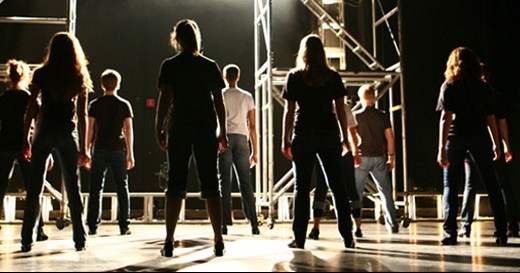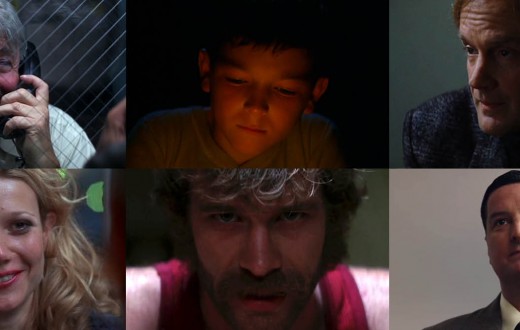“I had to stop going to auditions thinking, ‘Oh, I hope they like me.’ I had to go in thinking I was the answer to their problem.”
–George Clooney
If there’s one thing the internet of actors isn’t lacking, it’s audition advice. If audition advice were a cryptocurrency like Bitcoin, we’d all be billionaires.
Unfortunately, the value of much of that audition advice may be worth just as much as your cousin’s invention–good old ChadCoin–once the market crashes.
And mixed up in all that dubious advice are several myths about auditioning that aren’t doing any of us any favors when we step into that room and face the people behind the table. Here are a few of them and some ways to remove yourself from the mental traps they set.
1. You Begin the Audition After You Slate
So you’ve learned your sides, you’ve developed a character arc and laid down some solid objectives for your read. All you have to worry about is the moment after they say “Whenever you’re ready,” right?
Wrong. Like it or not, you are being assessed and judged from the moment you walk into the building where the audition is being held. Far too many actors behave abhorrently in the waiting room, talking too loudly, playing mind games trying to psych out other actors, or treating the support staff as if they were servants or worse. Any and all of these behaviors are a super quick way to get yourself at the top of the “we decided to go in a different direction” list.
The Fix: While you may not literally be scrutinized every second you’re in the building, the thing is you never know who is watching and listening. You also never know if you are going to be working with another actor who is there that day, either in the piece you’re currently auditioning for, or another one down the road. The acting community, no matter where you live, is a relatively small, insular group. You WILL develop a reputation if you hang around for any length of time; make sure it’s a good one that will inspire people to want to get to know you and work with you. And by the way, those support staff people? The ones who take headshots and resumes and hand you forms to fill out? They are often on the creative team in some capacity, depending on the project. Treat them nicely and you may benefit in the form of a tie-breaker vote. Treat them like something you scraped off your shoe and one well-timed word from them could cost you the job without you ever knowing why. Be excellent to each other!
2. You Should Treat Auditions Like A Job Interview
While there are certain norms of behavior we should all follow when auditioning that have to do with professionalism–preparation, dress, promptness and so forth–the fact is when you audition for a role you’re not so much asking to be hired for a job as you are asking to be adopted. As casting director Cathy Reinking (Frasier, Arrested Development) puts it, “You’re actually creating a family if you’re going to work on a project. I think it’s the opposite of a job interview. In a job interview you’re going to put up your public persona. I think it’s more the private person that we’re looking for.”
The Fix: It’s important to develop the confidence to allow your genuine self to emerge when you audition. Much in the spirit of the George Clooney quote at the top of this piece, auditioning isn’t so much about contorting yourself to fit into some box. It’s about making the casting team see that you are exactly the correct shape, and that they should construct the box around you. Fear of making mistakes and worrying that you’re too fat/tall/thin/short/old/young or whatever distracts your focus, fills you with tension, and makes you too rigid to simply be. Let it go!
3. You Must Be Off-Book
Generally speaking, if you talk to five people in the industry you’re going to get five different opinions. Or ten, depending on how recently they took their meds. But if there’s one thing you consistently hear from casting directors it’s this: when it comes to auditions, it’s more important to act than to be memorized. That’s what you’re there to do, after all, isn’t it? Seeing actors struggle to remember lines they just learned the night before is excruciating for casting directors. Worse, if all you’re doing is trying to dredge up words, they’re not seeing you at your best–or even seeing you ACT at all, not really. They’re seeing you recite, or attempt to. And anyway, there’s no prize for being “Most Memorized” at an audition.
The Fix: Yes, of course you must prepare. This isn’t at all to suggest that you don’t even glance at the sides and fly by the seat of your pants. However, preparation means several things, not all of which are being 100 percent off-book. As long as you know the character, the piece, the relationships with the other characters, and you have an arc and solid objectives to work for in the scene, it’s generally going to be acceptable if you hold your sides. Granted, you should have those words–and more importantly, their SIGNIFICANCE–ingrained in you! You should absolutely know what you’re saying and why. But bringing a genuine connection to the piece and the character is what lands you roles. And what you want is roles, not a gold star for being a bright boy or girl who knows all the words–and/or who ends up stuttering and stammering and looking up at the ceiling when those words escape, as they do.
The bottom line is you are the only you in the world. Your job when you audition isn’t to try to make yourself seem like a cop or a doctor or a mobster or whatever. Your only job is to be 100 percent the genuine and unique you that you are, and to bring all your weird quirks and funny ways into that role.
Rather than trying to make yourself fit the role you’re auditioning for, make them see that for their project to succeed as best it can, they need to make the role fit you!
You can’t get cast if you don’t get seen! Make sure you’re self-submitting and receiving email casting notices right here where thousands of industry professionals are looking for you!







